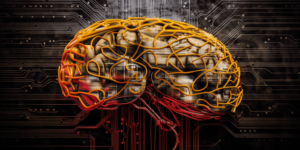Imagine a world where machines possess intelligence that rivals or even surpasses human cognition, solving complex problems and adapting to an ever-changing environment. This concept, known as Artificial General Intelligence (AGI), is at the frontier of AI research and may reshape our world in ways we cannot yet fathom. This article will guide you through the intricacies of AGI, its distinction from narrow AI, the state of AGI research, and the ethical considerations it brings.
AGI: A Bird’s-Eye View
Artificial General Intelligence (AGI) refers to a type of AI that can understand, learn, and apply knowledge across a broad range of tasks, much like a human being. In contrast, narrow or specialized AI is designed to excel at specific tasks, such as language translation or image recognition, but lacks the ability to transfer learning to unrelated domains.
The distinction between AGI and narrow AI is pivotal because it underscores a key difference in their capabilities and potential applications. While narrow AI has seen rapid advancements and widespread adoption in recent years, AGI remains elusive, representing the holy grail of AI research.
The Road to AGI: Challenges and Breakthroughs
The quest for AGI is a journey riddled with challenges. A primary obstacle lies in understanding the very nature of human intelligence and recreating it in a machine. Researchers are developing advanced machine learning algorithms that can learn and adapt to new information, but the transition from narrow AI to AGI is a daunting leap.
Yet, there have been significant breakthroughs. AI models, such as OpenAI’s GPT series, demonstrate an unprecedented ability to generate human-like text, suggesting a shift towards more generalizable capabilities. However, these models are still far from the kind of flexible, adaptable intelligence that defines AGI.
Ethical Considerations and Societal Impact
The potential implications of AGI are immense, and with them come a plethora of ethical considerations. Unbridled AGI could lead to a loss of control, as machines might develop their own objectives and outsmart their creators. This raises questions about the importance of instilling human values in AGI, ensuring that these machines serve as an extension of our collective wisdom rather than a threat.
Moreover, the deployment of AGI could significantly disrupt labor markets and social structures, as machines replace human labor across a wide range of tasks. This challenges us to envision a world where human ingenuity is channeled towards higher pursuits, and societies must adapt to harness the benefits of AGI.
Responsible Development and Deployment
To mitigate potential risks, researchers and policymakers are working to ensure the responsible development and deployment of AGI. Organizations like OpenAI have committed to prioritizing long-term safety and collaborating with other research institutions to address global challenges. Regulations are being considered to establish ethical standards and promote transparency in AGI development.
Conclusion
Artificial General Intelligence is a fascinating and complex concept that has the potential to revolutionize our world. As we stand at the precipice of this new era, it is crucial to understand AGI’s implications, embrace its potential, and strive for its responsible development. As we embark on this grand quest, let us remember that the power of AGI lies not only in the machines we create but in our ability to harness that power for the betterment of humanity.


